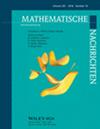通过电位法解决穆林斯-塞克尔卡问题
IF 0.8
3区 数学
Q2 MATHEMATICS
引用次数: 0
摘要
研究表明,二维 Mullins-Sekerka 问题在所有具有 .这是第一个在无界几何中建立这一问题的结果。我们方法的新颖之处在于利用势理论将模型表述为一个由奇异积分算子表示的非线性演化问题。本文章由计算机程序翻译,如有差异,请以英文原文为准。
The Mullins–Sekerka problem via the method of potentials
It is shown that the two-dimensional Mullins–Sekerka problem is well-posed in all subcritical Sobolev spaces with . This is the first result, where this issue is established in an unbounded geometry. The novelty of our approach is the use of the potential theory to formulate the model as an evolution problem with nonlinearities expressed by singular integral operators.
求助全文
通过发布文献求助,成功后即可免费获取论文全文。
去求助
来源期刊
CiteScore
1.50
自引率
0.00%
发文量
157
审稿时长
4-8 weeks
期刊介绍:
Mathematische Nachrichten - Mathematical News publishes original papers on new results and methods that hold prospect for substantial progress in mathematics and its applications. All branches of analysis, algebra, number theory, geometry and topology, flow mechanics and theoretical aspects of stochastics are given special emphasis. Mathematische Nachrichten is indexed/abstracted in Current Contents/Physical, Chemical and Earth Sciences; Mathematical Review; Zentralblatt für Mathematik; Math Database on STN International, INSPEC; Science Citation Index

 求助内容:
求助内容: 应助结果提醒方式:
应助结果提醒方式:


